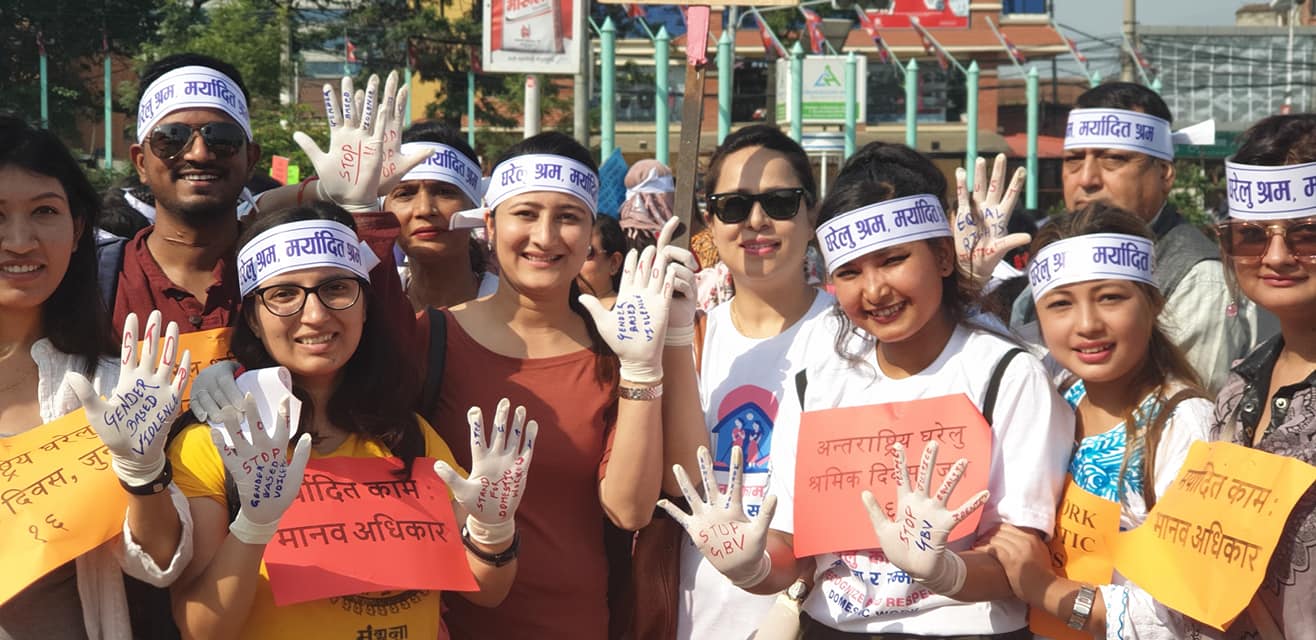ESCR campaign of WOREC is aimed at ensuring human’s economic, social and cultural rights. WOREC Nepal has been advocating and promoting economic, social and cultural rights (ESCR) of women, marginalized and vulnerable communities from the right-based approach from grassroot to national level. The campaign aims at ensuring the rights of women to enjoy the highest attainable standard of physical, mental and reproductive health, right to food and right to mobility for sustainable livelihood and dignified lives. The government of Nepal is obliged to respect, protect and fulfill the rights realized under the

WOREC has been working to address trafficking and its consequences since its establishment centering women’s empowerment, recognition of women’s agency and advocating women’s right to work and live with the principle of equality at all spheres of public and private life. The vulnerability of women to forced labour is created due to different dynamics of power relation however WOREC’s underlying belief is that reducing vulnerability to forced labour is possible by applying the approach that leads to transformative power relation between male and female. This can be done by facilitating women's empowerment process through information and appropriate training/life skill, enabling environment for women to defend, demand, protect and promote their rights. Likewise, WOREC strongly believes that continuous lobby and advocacy with the key stakeholders is equally important to influence policy and practices at household, local level, and national level to ensure women’s right to equality. That, in turn, will create an environment for women to exercise their right to mobility and get treated as decent workers. With this understanding and approach, WOREC was the first organization in the country to initiate dialogue with various stakeholders on the concept of safe labour migration and the right to mobility of women. WOREC started disseminating information on safe migration through information booth at Dhanusha and organizing community-based orientations to make people aware on women’s right to equality. In addition, the organization pioneered the concept of safe migration information booth by establishing it at Janakpur, Dhanushadham, which later was expanded to the districts such as Morang, Sunsari, Udayapur, Siraha, Dang and Kailali. WOREC is still giving continuation to the booth in Morang, while the booths in the remaining districts have been handed over to the government and Safer Migration Project (SAMI). Similarly, WOREC institutionalized the concept of community-based information centres establishing information desk at VDCs (now rural municipalities) of Morang district.
Besides this, WOREC has set up an excellent example of how trafficking survivors can properly get reintegrated or mainstreamed into the society when support is provided from the right based approach and guided by victimhood to agency philosophy by facilitating to establish Shakti Samuha, the first organization of survivors in this globe[2].
Under this the campaign, WOREC works at the local level to empower marginalized community women and ensure women's right to mobility by reducing possibilities of labour exploitation, abuses, and trafficking. The majority of the interventions in this campaign focuses on women’s empowerment including the capacity of community workers to support women’s empowerment focusing on aspirant women migrants and returnee women migrant workers. Information Dissemination, capacity building, and skill development training and strengthening are the major tools to support the empowerment process of women. Issues and cases collected from the community will be documented to strengthen WOREC’s evidence-based advocacy practices.
The pertinent issues that come out of the community interventions will be taken at the national and international forum for further interventions through discussions, meetings, interaction programs, workshops, rallies, and demonstration. Need-based and time demanded advocacy papers including attention letters and press releases related to the emerging issues of women migrant workers will be prepared to sensitize the government and non-government stakeholders. The majority of lobby and advocacy activities under this campaign are;
· Proper implementation of existing policies on foreign labour migration and human trafficking and formation of gender-sensitive migration policies
· Proper implementation of Nepal Labor Law 2074 and Social Security Act 2075 and series of discussion at the local, province and national level.
· Advocacy on ratification of international instruments to protects and promotes the rights of migrant workers
· Promotion of fair recruitment practice and proper implementation of the Employer Pay Model
National Network: Alliance Against Trafficking of Women and children in Nepal (AATWIN), National Network for Safe Migration (NNSM), Coalition for Women’s Right to Mobility[3], trade union and other like-minded organizations.
International Network: Global Alliance for Traffic in Women (GAATW) and Migrant Forum in Asia (MFA).
[2]According to Trafficking in Person (TIP) report, 2007 disseminated by American Government.
[3]Coalition for Women’s Right to Mobility is a loose network of seven women’s led organisations advocating for Women’s Right to Mobility. The members include WOREC, POURAKHI, Shakti Samuha, Jagriti Mahila Mahasangh, Shakti Milan Samaj, National Alliance of Women Human Rights Defenders, Amnesty International Nepal and Women Forum for Women (WOFOWON).